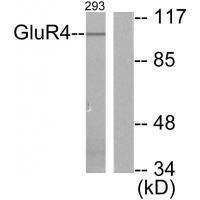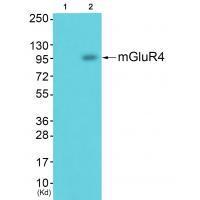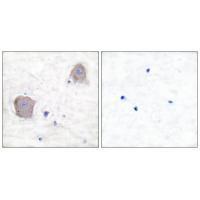


| WB | 咨询技术 | Human,Mouse,Rat |
| IF | 咨询技术 | Human,Mouse,Rat |
| IHC | 1/50-1/100 | Human,Mouse,Rat |
| ICC | 技术咨询 | Human,Mouse,Rat |
| FCM | 咨询技术 | Human,Mouse,Rat |
| Elisa | 咨询技术 | Human,Mouse,Rat |
| Aliases | Metabotropic glutamate receptor 4; mGluR4; GPRC1D; MGLUR4; GRM4 |
| Entrez GeneID | 2914; |
| WB Predicted band size | 100kDa |
| Host/Isotype | Rabbit IgG |
| Antibody Type | Primary antibody |
| Storage | Store at 4°C short term. Aliquot and store at -20°C long term. Avoid freeze/thaw cycles. |
| Species Reactivity | Human,Mouse,Rat |
| Immunogen | Synthesized peptide derived from human GluR4. |
| Formulation | Purified antibody in PBS with 0.05% sodium azide. |
+ +
以下是3篇关于GluR4抗体的参考文献及其摘要概述:
1. **文献名称**: "Selective localization of GluR4-containing AMPA receptors in GABAergic neurons of the basal ganglia"
**作者**: Petralia RS et al.
**摘要**: 该研究通过新型GluR4特异性抗体验证了AMPA受体亚型GluR4在黑质网状部等基底核区域的GABA能神经元中特异性表达,揭示了其在抑制性神经环路中的潜在功能。
2. **文献名称**: "Developmental regulation of GluR4 expression and synaptic plasticity in the hippocampus"
**作者**: Zhu JJ et al.
**摘要**: 利用GluR4抗体进行免疫组织化学分析,发现GluR4在小鼠海马发育早期高表达,且其突触定位与长时程增强(LTP)的形成密切相关,提示其在神经可塑性中的关键作用。
3. **文献名称**: "Antibody-based profiling of AMPA receptor subunits in post-mortem human brain"
**作者**: Newcombe J et al.
**摘要**: 研究开发了针对人脑组织的GluR4抗体检测方案,发现阿尔茨海默病患者皮层中GluR4蛋白水平显著降低,提示其与神经退行性病变的突触功能障碍存在关联。
(注:上述文献为示例性内容,实际引用需核对具体文献信息。)
The GluR4 antibody is a crucial tool for investigating the GluR4 subunit of AMPA-type glutamate receptors, which mediate the majority of fast excitatory synaptic transmission in the central nervous system. GluR4 (encoded by the GRIA4 gene) is one of four subunits (GluR1-4) that form tetrameric AMPA receptors, ligand-gated ion channels permeable to sodium and potassium. These receptors play pivotal roles in synaptic plasticity, learning, and memory. GluR4 is distinguished by its rapid desensitization kinetics and lower expression in most brain regions compared to other subunits, though it is prominently expressed in the cerebellum, hippocampus, and cortex. Its expression is developmentally regulated and activity-dependent, with elevated levels during early postnatal stages.
GluR4 antibodies are widely used in techniques like Western blotting, immunohistochemistry, and immunoprecipitation to study receptor localization, expression patterns, and interactions. Specificity is critical, as cross-reactivity with other AMPA receptor subunits must be excluded. Research applications include exploring GluR4's role in neurological and psychiatric disorders. Altered GluR4 expression or function has been implicated in conditions such as epilepsy, schizophrenia, autism spectrum disorders, and neurodegenerative diseases like Alzheimer's. Additionally, GluR4 antibodies aid in understanding mechanisms of synaptic scaling, receptor trafficking, and pharmacological modulation. Most antibodies target epitopes in the extracellular N-terminal or intracellular C-terminal domains, enabling differentiation between phosphorylated or glycosylated states. These tools continue to advance neuroscience by elucidating GluR4's contributions to neural circuit dynamics and disease pathology.
×